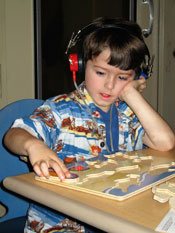Llame hoy
Si tiene preguntas, por favor llámenos para obtener más información.
When 5-year-old Benjamin Hart starts kindergarten next fall, he’ll be in a public elementary school in Salinas, California. While that may be unremarkable for most, for Benjamin it’s a reason to cheer. Benjamin’s road was bumpy until, as Benjamin’s mother, Kathryn says, “a true-life heroine put Benjamin on the right track.”

The journey started when Benjamin was 14 months old. Recalls Kathryn, “Benjamin only had four or five words in his vocabulary. I looked at the charts and he didn’t have all the sounds he should have had at that point and he wasn’t repeating after me.”
Suspecting a hearing problem, Kathryn took Benjamin to the pediatrician, but he responded to her concerns by saying that every child develops differently. Another doctor suggested that Benjamin had a behavioral problem. But when Benjamin, now 2 years old, only had 10 words in his vocabulary, Kathryn wasn’t content with either explanation. She returned to the pediatrician’s office. During the visit, the doctor tried to give Benjamin a standard hearing test, but he wouldn’t respond.
Benjamin’s journey was just beginning. Now nearly 3, Benjamin was referred to an audiologist, who administered a behavioral test that was inconclusive. Again, the audiologist deemed Benjamin unresponsive and recommended an ABR (Auditory Brainstem Response) to test the integrity of Benjamin’s auditory system. Remembers Kathryn, “It was so traumatic getting Benjamin to sleep—which is required for the test. We were spent. After the test, the audiologist said that she didn’t see anything wrong, just a little fluid, and he should get tubes. But then she went one step further and said, ‘I think he’s autistic.”
A referral to a pediatric neurologist confirmed the diagnosis of autism, resulting in a prescription for 3 months of speech therapy. If at the end of the 3 months, Benjamin wasn’t talking more, the doctor was going to put Benjamin on Prozac. But just when Kathryn felt she had hit bottom, things started to change. Benjamin was getting weekly speech therapy and his therapist began to doubt the diagnosis. “She’s the first one who agreed that Benjamin couldn’t hear. She urged me to get his hearing retested,” says Kathryn.
Back to the audiologist they went, and Benjamin underwent another ABR test. When the results came back inconclusive yet again, the audiologist suggested digital hearing aids. Kathryn finally lost her patience. “I looked at him and said, ‘Okay, you don’t know if he can hear or not, and you and the pediatric neurologist are convinced that he’s autistic. Why would I want to spend all that money on digital hearing aids when they may not help him at all?’” Kathryn demanded a third test.
This time, she waited for the audiologist to call with the results. And she waited. After three weeks of calling she finally spoke to the doctor, who said he thought Benjamin had auditory neuropathy, a condition that can cause inconsistent responses to sound and delayed speech and language development. Says Kathryn, “At this point, the doctor said that Benjamin’s problem was way out of his league. So he referred us to the Audiology Service at Lucile Packard Children’s Hospital.”
It was an event that would change the Harts’ lives. From their first meeting with Dr. Jody Winzelberg, Benjamin responded like never before. “I saw my son do something I had never seen before: he concentrated and paid attention for an entire hour. She had a kind of magic with him,” recalls Kathryn.
Based on her initial tests and review of past records, Dr. Winzelberg knew Benjamin was probably not autistic and definitely did not have auditory neuropathy. He was mostly deaf in his left ear and had severe hearing loss in the low-to-mid pitches rising to only a mild loss in the very highest pitch tested in his right ear. “The words he knew suddenly make sense. It was ‘Stop It!’, ‘No!’, and other danger things, all the high-pitched noises,” says Kathryn. “Dr. Winzelberg sent us home with loaner hearing aids and everything started to fall into place. Benjamin started responding more in speech therapy right away.”
Two weeks later, at 4 years of age, Benjamin was fitted with custom earmolds for digital hearing aids and, at Dr. Winzelberg’s urging, enrolled in preschool at the School for the Deaf in Salinas. “We’re so lucky, because it’s one of the best programs in the state, and it feeds into the mainstream elementary school,” says Kathryn. “They are taking Benjamin into the kindergarten class two days a week to get acclimated, and he’s doing fine. He has about 500 words now.”
Kathryn sees a complete change in Benjamin’s personality, not just in his speech, since getting the correct diagnosis. “This was a child who did not want to be touched. Now, he’s very affectionate and wants to interact with other kids,” says Kathryn. “It’s amazing that he’ll get to go to regular kindergarten next year, and he’ll only be one year behind. Dr. Winzelberg is our heroine.”
Conéctese con nosotros:
Descarga nuestra App: